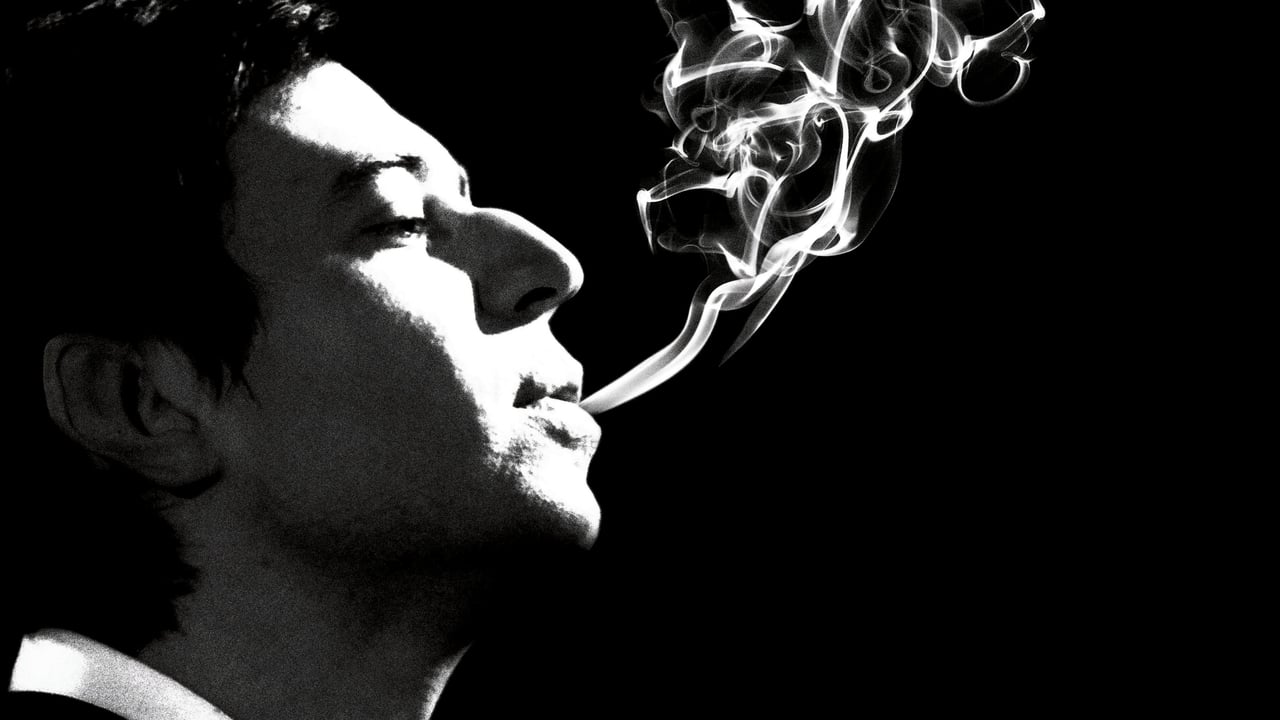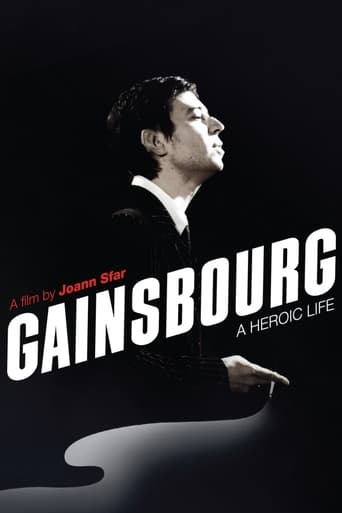

Lucien 'Serge' Ginsburg is an odd-looking imaginative Jewish boy. In Nazi-occupied Paris, he is the first to get the yellow star of David before the office even opens. His unrelenting flirting charms the ladies despite his young age. After the war, he played piano like his father and later gained success with his original songs. There are his many loves, a short affair with Brigitte Bardot, and a longer one with Jane Birkin. Jane becomes the mother of Charlotte Gainsbourg. Through it all, there is always the surreal figure of a caricature Serge.I don't know anything about Serge Ginsburg. His childhood seems interesting and got me locked in during the first act. His turn into adulthood is less compelling and his life story becomes messier and messier. His love life may be interesting for dropping the Bardot name. The surreal character is interesting at first but the movie does become chaotic.
... View MoreIt would be difficult to make a dull film about someone as fearlessly unconventional as iconic French songwriter, Serge Gainsbourg (1928- 1991).This, after all, was the man who coaxed a teenage starlet unwittingly to sing a song about oral sex; who outraged French nationalists by releasing a reggae version of 'La Marseillaise' with Jamaican musicians, Sly and Robbie; who propositioned Whitney Houston live on French TV. His sex obsession wasn't all talk, either; he seduced the likes of Brigitte Bardot, Juliette Gréco and Jane Birkin. In Britain, he is best known for the chart-topping moan-and-groanathon 'Je T'Aime Moi Non Plus' and largely remains a minority interest here. In France, however, he has long been held up as a national treasure, a symbol of Gallic panache, style and defiant rule-breaking. And today, you can't help wonder whether the French need him more than ever.As a first-time director, Joann Sfar does a credible job with Gainsbourg (Vie héroïque) in charting the many colourful incidents in Serge's career. There are so many rich pickings in Gainsbourg's life that some of them, the aforementioned Houston controversy and the 'Lemon Incest' single that he recorded with his daughter Charlotte, are left out. Likewise, Gainsbourg's relationships are sometimes covered in a sketchy way; his life with his first wife, Elisabeth 'Lize' Levitsky, is mentioned only fleetingly.To be fair, though, Sfar appears intent on giving us a psychological portrait of Gainsbourg (superbly played by Eric Elmosnino), an exploration of what fuelled his demons, insecurities and ambitions. The film starts with the young Lucien Ginsburg - his real name - experiencing the degradations of Nazi-occupied Paris. As Jews, he and his family are forced to wear the yellow star and to look at grotesque anti-Semitic caricatures everywhere they turn. This is perhaps the most eye-catching part of Gainsbourg - it's an unflinching examination of French complicity in the persecution of its Jewish citizens. Elsewhere, the film notes how Gainsbourg's 'trouble making' was sometimes blamed on his Jewishness, and was therefore said to have played a part in stirring up anti-Semitism.All of this is dealt with in an impressive, playful style: an anti- Semitic caricature from a Nazi poster comes to life and follows young Lucien around. Later on, a similar grotesque version of Gainsbourg himself, 'The Mug', acts as a sort of right-hand demon, willing Gainsbourg on to greater mischief, seduction and, importantly, artistic achievement.We see Gainsbourg the struggling painter and writer, earning a crust playing muzak piano in Paris bars before discovering his real strengths as a witty lyricist and strikingly original songwriter capable of turning his hand to any musical genre. Curiously for a music biopic, Gainsbourg's songs only make cameo appearances, such as when Bardot (Laetitia Casta) zips up her boots to the sound of an instrumental version of Harley Davidson. And there's an amusing scene where, mid- 1970s, Gainsbourg tries his hand at jerky new wave – successfully – with his notorious 'Nazi Rock' single. Unfortunately, no amount of stylistic brilliance compensates for his declining 1980s period, wherein Gainsbourg's Olympian intake of cigarettes and alcohol took its toll on his appearance, voice and general demeanor. It almost unravels the iconography he created during his peak, but the fact he could still pull beautiful young women suggests he hadn't quite lost it.The fascinating thing about Gainsbourg is as much what it says about contemporary France as about Serge's life. The film was released in France in the midst of a national debate on French identity. And since the fiasco of France's World Cup campaign in South Africa this summer – when the team revolted against the coach and suffered an ignominious early exit - this identity crisis has intensified. One French journalist reckons that the 'bad-tempered, illiterate and uncultured' national football team are symptomatic of a broader malaise across the whole of French society. The world of art, music and writing so lovingly portrayed in Gainsbourg is no doubt a forlorn reminder of the High Life that France was once fondly associated with.Serge's musical gifts are an advertisement for the cultural gifts that the French nation has often given Europe and the rest of the world. But the film's recurring meditation on racism and anti-Semitism in France - and the constant shadow of Nazi collaboration - is also a signifier of national self-loathing and self-doubt. Indeed, last year's French remake of the Gaullist 1969 film Army of Shadows, retitled Army of Crime, acknowledged the French state's complicity in Nazi atrocities that the original left out. This would have been unthinkable even a decade ago.In this sense, France is going through a similar bout of national self- abasement to the one Britain has been experiencing for the past 10 years or so. Revelations and then movies about Britain's dirty war in Northern Ireland have become commonplace, as have apologies from on high for Britain's colonial record generally and its role in the African slave trade.The French president, Nicolas Sarkozy, was on to something when he said he was worried about the shift towards 'self-hatred' within French society and its potentially destructive impact. Unfortunately, his call for a debate about 'national identity' has been as clumsy as that initiated by British politicians, while his decision to stop Muslim women wearing the burqa in public suggests that France really has lost its understanding of what it means to be a secular, liberal nation rooted in Enlightenment values.Gainsbourg appears to be influenced by these contemporary tensions in French society. While on the one hand it happily plays on the Gallic stereotypes of freedom-loving aesthetes with a liberal attitude towards sex, it also morbidly dwells on the Nazi occupation and residual racism across French society. Appealing to past glories and abasing past disgraces, however, won't help resolve the question of French national identity today. The French only need to look across the Channel to see the folly in that strategy.
... View MoreDiane and I had much the same opinion of this film: we thought that it was far too mannered for our taste and that the substance of this man's life could have been presented, directionally, more staid. During the film I kept thinking of Baz Luhmann's Moulin Rouge, another movie that was too mannered. It just goes to show how much people's taste varies because I sat through the movie and left wondering what I had seen; what was all the fuss about? I did not find out much of substance about the guy or his background or sequential events in his life. As a viewer, if you are looking for a minor biographical look at this man's life then buy a book. If on the other hand you don't mind seeing a Picassoesque rendering of Serge Gainsbourg's life then this movie is for you—enjoy!
... View MoreThis smoky snazzy superficial look at the life of sex and song of Serge Gainsbourg and the women he seduced is a fairly interesting movie. However at 130 mins it can do with a haircut. In fact most everyone in the film could have done with one, or at least a comb. All bohemian, lazy, sleepy and ennui soaked, we get to see how boy Lucien Gainsbourg morphed from butterfly child into Serge the Caterpillar adult with his 'charms' exuding Gallic sex appeal to some very famous pop culture women. His comic book songs are really just bubblegum and the Bonnie Parker song of 1967 is a ridiculous moment in radio junk. I remember these songs from 42 years ago and all this film did was remind me how silly the songs were... like something from a BEACH PARTY drive in movie but with Serge and Brigitte pouting and spouting at each other. The Jane Birkin years are far more interesting but the film slides into maudlin parody of what is becoming a boring indulgent man by the 2 hour mark. Seeing him flopping around a disco is tragic and boring. The use of a puppet as his alter ego is a terrific device. The film is well made and overall a few blips above interesting. The shattering news that actress Lucy Gordon suicided at age 28 casts a really dark heartache over the film. Remember those awful Euro pop songs of the 60s like Blue Blue My love Is Blue... well we are in a bio about a man who wrote songs just a bit better than that. It all just reminds you to see Euro pop flicks like BARBARELLA again. If you go into this willing to float along with it, then you will be satisfied.
... View More